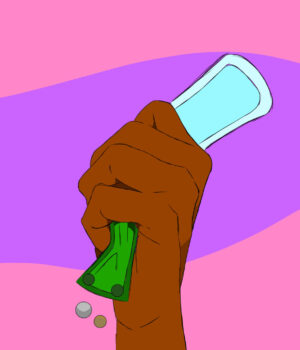by Alexis Barton
Dr. Carrie Murawski and Dr. Wendy Larson-Harris are working in collaboration with their INQ 120 students to raise awareness for period poverty on campus. Period poverty is best defined as a lack of access to menstruation products, whether it be physical availability or the inability to afford those products. In practice, this struggle may look like mothers choosing to buy food for their children rather than a box of tampons, or young girls missing school due to their period, according to Dr. Murawski. Period poverty is slowly becoming more central to discussions of accessibility and intersection, as this issue does not impact all menstruating individuals equally. Impoverished individuals are significantly more likely to experience period poverty. This is not to say that it isn’t a widespread issue, however. In Virginia, 1 in 6 women between the ages of 12-44 experience poverty, and 1 in 4 will experience period poverty at some point in their life.
To help raise awareness and to contribute directly to local solutions, students from Dr. Murawski’s class will be tabling outside of the Colket Center throughout the month of March. Dr. Murawski shares that, “some days they are inviting students to take a survey about access to period products on campus and other days they are inviting students to donate extra meal swipes so that we donate period products to Ursula’s Café, a non-profit that serves Roanoke’s underprivileged community members. They are handing out candy as well as student designed menstruation-related stickers and a brochure with more information about period poverty”.
Dr. Murawski also spoke to the importance of addressing this issue in the midst of women’s history month. She shared, “While there are many important conversations around women’s issues and celebration of women’s contributions to the world, there is still little discussion about menstruation. Periods are seen as gross, a burden, and something that brings a lot of shame. Most folks who menstruate go through great lengths to hide the fact they have periods. My class is trying to disrupt this notion by normalizing conversations about periods so that we can better address inequality around menstruation”.
For more information about getting involved in the fight against period poverty and disrupt the stigma around periods, stop by this class’ tables throughout the month.




